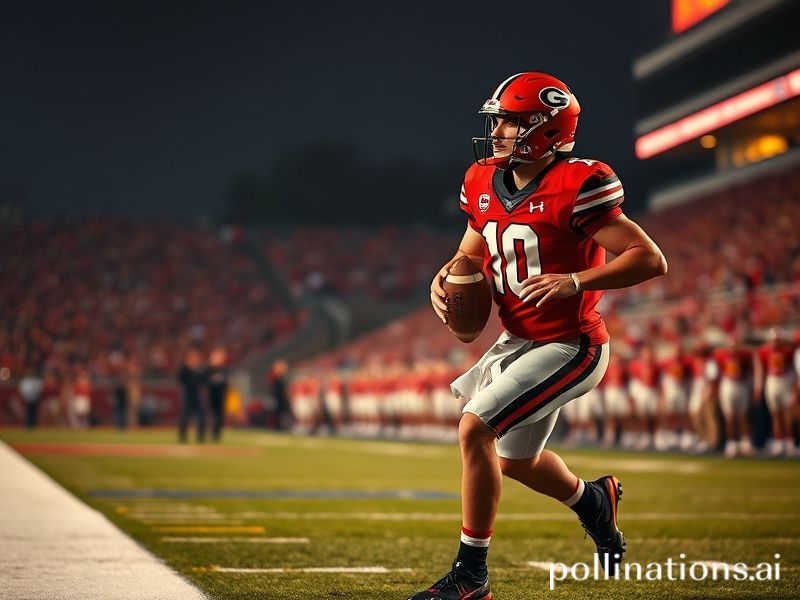From Georgia to Global: How Gunner Stockton Became the World’s Favorite 19-Year-Old Arm
Gunner Stockton and the Peculiar American Sacrament of Quarterbacking
by Our Man in the Cheap Seats, Somewhere Over the Atlantic
Somewhere between the war in Ukraine and the latest TikTok dance craze, a 19-year-old from south Georgia named Gunner Stockton has become the object of trans-Atlantic fascination. To the rest of the planet—where “football” still involves actual feet—Stockton is merely the latest iteration of a uniquely American demigod: the freshman quarterback whose right arm is treated as a geostrategic asset. In the United States, his commitment to the University of Georgia was covered with the breathless solemnity of a NATO accession ceremony. Abroad, we watched the clip, shrugged, and returned to our lower-octane obsessions, like heating bills.
Yet the phenomenon bears inspection, if only because it illustrates how a nation that cannot reliably keep its trains on the tracks still manages to weaponize nostalgia for 18-year-olds in tights. Stockton—6-foot-1, cannon attached—has been groomed since middle school to pilot an offense that generates more annual revenue than the GDP of Samoa. The multinational sponsors (Japanese cameras, German cars, Korean electronics) are already queued up along the Sanford Stadium hedges, ready to beam his likeness into living rooms from Lagos to Lahore. The kid hasn’t started a single college game, but his surname has already been fed through the algorithmic abattoir: SEO-optimized, NFT-ized, whispered in the same sentence as certain Heisman odds that pay out in offshore crypto.
Europeans, who spend Saturdays watching relegation scraps and existentialist midfielders, tend to view this spectacle with the mild horror reserved for American medical bills. “You give a teenager tactical control of a billion-dollar concern?” a Bundesliga executive asked me over weissbier. “We make our 19-year-olds run wind sprints until they learn to recycle properly.” He was only half joking. The contrast is instructive: where Old World academies treat prospects as factory apprentices, the NCAA still insists its gladiators are “student-athletes,” a designation as believable as North Korean election results.
Down in the Global South, the footage arrives via bootleg streams riddled with casino pop-ups. In Lagos traffic jams, hawkers sell knockoff Stockton jerseys next to pirated Avengers DVDs. The symbolism is not lost on anyone: here is another American export promising salvation, this time wearing a red helmet instead of a cape. Whether rural Nigerians grasp the nuances of Cover-3 vs. quarters is irrelevant; they recognize the silhouette of power, the same way they recognize a McDonald’s arch.
Asia, meanwhile, approaches the matter with entrepreneurial glee. Chinese trading-card speculators already list his autographed Bowman Chrome at three times the price of a Shanghai parking permit. South Korean esports coaches have dissected his high-school cut-ups for “pocket-awareness metrics,” apparently convinced that quarterback vision translates to StarCraft micro. Somewhere in Tokyo, a salaryman has programmed a deep-learning bot to replicate Stockton’s release mechanics; it now throws perfect spirals in a VR headset, which is more than the Jets can say.
All of which raises a question only Americans are too polite to ask: what happens if the kid tears an ACL before Thanksgiving? The short answer is that the machine keeps humming. Backup quarterbacks are like vice presidents—useful for photo-ops, easily replaced. The longer answer is darker. In a country that outsources manufacturing but insists on home-grown legends, the quarterback is the last artisanal product. When one fails, another is already incubating in 7-on-7 leagues sponsored by energy-drink conglomerates. Supply meets demand, amen.
International readers may conclude that this entire saga is merely late-capitalist performance art. They would not be wrong. Still, there is something almost admirable in the sheer scale of delusion required to elevate a teenager into a multilateral brand, then insist he major in agricultural business “just in case.” It is, in its own deranged way, a tribute to American optimism—proof that even in an age of drone strikes and algorithmic despair, we still believe the next kid can throw the perfect pass that outruns all our mistakes.
Kickoff is 3:30 p.m. Eastern. The rest of the world will be watching, bemused, as always.







